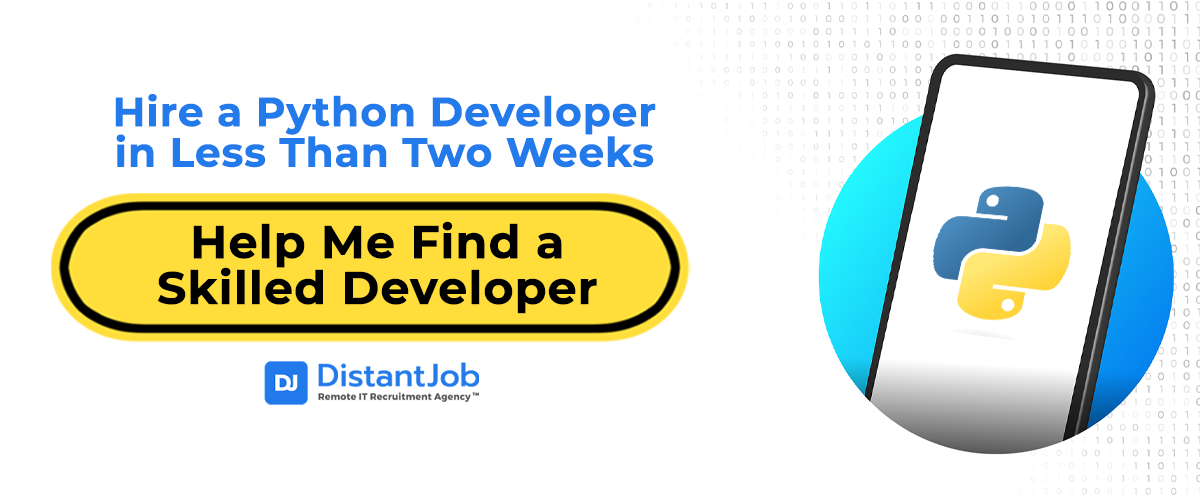Being or hiring a talented Python developer is less about the developer per se and more about matching the exact skills your project demands. What you need comes first. Python is a language with many applications, and if you are a back-end developer, chances are you can’t program a robot. In the same way, if you are an RPA developer, it’s unlikely you can do the back-end of your webpage.
In this article, we are going to explore Python Developer skills, roles, tools, and responsibilities more. It will have some tips as well.

What Does a Python Developer Do?
Python is a general-purpose coding language, unlike HTML, CSS, and JavaScript. It can be used for other programming types besides web development (for example, back-end development, software development, data science, etc.).
Python’s design philosophy focuses on code readability. Its language constructs and object-oriented approach allow developers to write clear code for small and large-scale projects.
A Python developer is in charge of coding, developing, designing, integrating, and debugging software products, usually on the server-side logic.
But the work of a Python developer evolves with their level of experience, and it’s important to know exactly what to expect of your developers:
What are the responsibilities of a junior Python developer?
Entry-level Python developers will shadow the more senior developers and learn from them. They will often be tasked with writing unit tests and improving the existing code with supervision from other developers who can mentor them and quickly help them grow. They also learn and apply software development methodologies like Scrum and DevOps.
What are the responsibilities of a mid-level Python developer?
Mid-level Python developers are expected to be capable of writing and building components to integrate into new or existing systems, or maintaining existing code by providing fixes and other code changes.
What are the responsibilities of a senior-level Python developer?
Besides mentoring the newer developers in the team, senior developers should be capable of designing entire systems and architectures for software solutions with appropriate technologies. They can work independently on complex projects, analyze technical requirements, and contribute to scalability, development, and deployment. They should also collaborate with other team members and potentially mentor junior developers. Finally, they must have strong problem-solving skills.
Basic Python Developer Skills and Tools
Here are some of the most common Python skills and tools required of developers:
- Package Managers: Anaconda, Conda, MiniConda, Poetry, Pop, PyPi, and uv
- Common Packages are asyncio, pathlib, requests, pandas, numpy, dataclasses, pathlib
- Asynchronous Frameworks like aiohttp, gevent, Tornado, Sanic
- Synchronous Frameworks such as Plotly Dash, Pyramid
- Synch + Asynch Frameworks like Fast API, Django, Flask
- Concurrency with GIL, Multiprocessing, Asynchrony, Threading
- Environments: Pipenv, pyenv, virtualenv
- Static Typing Tools: mypy, pyright, pyre, Pydantic, typing
- Code Formatting Tools: yapf, black, ruff
- Documentation Tool: Sphinx
- Testing Tools: doctest, pytest, Tox, Nose, PyUnit
Python Developer Other Important Skills
Python developers add new skills to their repertoire as the technology changes and is adapted to more industries, which benefits both developers and the companies that hire them.
Here are some roles that Python developers may apply to, and the skills and tools recommended:
- The ability to create, design, manage, and maintain an API.
- Django is a free and open-source, Python-based web development framework for synchronous and asynchronous programming.
- Flask is an open-source microframework for web development. It doesn’t require extra tools or libraries.
- REST is a software architecture that defines communication between different systems, making API creation easier.
- SQL is a programming language used to store, manipulate, and process data in a database.
- System Architecture is the blueprint that defines how a system is designed and how it works.
- Short for Numerical Python, NumPy is a must-have library for numerical and scientific computing in Python.
- Pandas is a Python library that provides data structures and functions for manipulating and analyzing structured data. It requires NumPy.
- Regression analysis is a statistical method to model and analyze the relationship between data variables. Example: Which type of public is more prone to buy a certain product. We test many types of regression and check the one that can predict behavior more accurately.
- Altering or transforming raw data into a more usable and insightful format for analysis, reporting, or visualization.
- A tool for Infrastructure as Code (IaC) that allows users to define and provision data center infrastructure using HCL as a programming language.
- Also a tool for Infrastructure as Code (IaC) that allows users to define and provision data center infrastructure, but open-source and doesn’t need HCL (you can use just Python).
- Crossplane is a cloud native control plane framework that allows you to build control planes without needing to write code. It uses Kubernetes to manage cloud resources.
- Docker is a set of development tools, services, trusted content, and automations to create containers (software in virtual packages).
- Complete platforms to create complex automation solutions in Python.
- AA is a low-code management system that automates companies’ business tasks.
| Role | Skills |
| Back-End Developer | API management Django Flask RESTful SQL System Architecture |
| Data Analyst/Scientist | NumPy Pandas Regression Data Manipulation |
| Cloud Engineer/Automation Developer/DevOps Developer | Terraform Pulumi Crossplane Docker |
| Robotic Process Automation Developer | BotCity UiPath Automation Anywhere Blue Prism |
Python Developer Roles and Responsibilities
What Python developers do will change according to the type of job they perform:
Software Engineer:
- Develop and maintain code
- Write unit tests
- Debug software
- Integrate third-party code and APIs
- Assess code and feature change requests
- Evaluate and produce technical solutions to proposed problems
Back-End Developer:
- Write back-end code and logic
- Provide mechanisms to communicate with and update the back-end
- Maintain the back-end updated and optimized
- Integrate web frameworks
- Deploy applications
Data Analyst:
- Create scripts to collate and analyze data
- Work with Python math and utility libraries
- Create data models to use in reports for internal or client use
Data Scientist:
- Research and implement Machine Learning algorithms
- Make use of Machine Learning environments, platforms, and libraries
- Train and fine-tune the Machine Learning algorithms to adapt to new variables and realities
- Deploy Machine Learning Models to production environments
- Analyze statistical data
Automation Developer:
- Design and Develop Automation Solutions
- RPA (Robotic Process Automation) to build software robots
- IT Automation for automating tasks
Cloud Engineer:
- A cloud engineer is a developer who design and develop Cloud Solutions
- Build Infrastructure as a Code
- Configure Virtual Machines and Containerization
- Design Security Systems and Perform Security Modeling
Python Developer Job Description Template
We are looking for an experienced Python developer to design an automated system that monitors, identifies, and sends promotions. These promotions are from promotional airfares with miles (award fares) on the websites of the main airlines (Delta, American, Southwest, United, etc.).
This system must:
- Automatically monitor websites and loyalty programs in search of promotions with miles;
- Filter offers based on criteria such as dates, values, and destinations;
- Record these offers in Google Sheets or the web panel;
- Send the offers to Messenger and Snapchat apps automatically;
- Be programmed with robust documentation.
Desired skills:
- Web Scraping (Python with BeautifulSoup/Selenium, or similar technology);
- Integration with APIs;
- Automations with Make, Zapier, or custom scripts;
- Bots for Messenger and Snapchat;
- Basic knowledge of UI/UX for web dashboard (desirable)
Expected deliverables:
- Functional bots for automatic web scraping
- Integration with Google Sheets or a dashboard (PowerBI or Looker Studio) for visualization
- Automated sending to Snapchat/Messenger group
- Basic support in the initial implementation
- Simple technical documentation
Your responsibilities:
- Writing reusable, testable, and efficient code according to our guidelines
- Design, implement, support, and maintain the automated system with reliability in Make, Zapier, or custom scripts
- Collect, filter, and store data automatically in a Google Sheet or a dashboard
- Integrate the system with relevant APIs
- Creating clear and simple technical documentation for the developed system
7 Key Skills Python Developers Should Have
Which Python skills are in demand? These are the top 7 skills to look for in Python developers that we usually seek out in our candidates.
And if this seems like too much information, let us at DistantJob do the hard work for you. We’ve been helping companies find their perfect remote developers successfully in a matter of weeks!
1. Solid knowledge of the Python programming language
Having solid knowledge of the language is, of course, essential. But testing this knowledge can sometimes be hard.
If you want to be thorough when interviewing your candidates, it’s important to ask the right questions. Ask about specific Python concepts such as data structures, data types, exception handling, file handling, generators, etc. If they don’t show hesitation when answering these types of questions, you can be certain that they know what they preach.
If you don’t know much about Python skills, or any given language, check roadmap.sh. It’s highly recommended that you learn at least a bit before recruiting.
2. Understanding of Python Frameworks
Knowledge of Python frameworks can make the development process faster and eliminate the need for low-level stuff such as threads or sockets. I would recommend FastAPI for API development, Django for web development, and Flask for a sync microservice framework.
3. Proficiency in Object Relational Mapper (ORM)
Object Relational Mappers (ORMs) allow the conversion of data between incompatible types and give developers the flexibility to switch to another relational database if required.
Using ORMs, Python developers can continue to write in Python code instead of using SQL to create and update data schemas.
Most popular ORMs include:
4. Familiarity with Python Libraries
Python has many great advantages, and one of them is its massive collection of libraries. According to the Python Package Index, Python has over 267,000 projects. So, when developers plan to create something or are stuck in the middle of a project, they have all these libraries available for them with the necessary documentation and guidance.
When interviewing a Python developer, ask them about the libraries they have used in the past or why they have to use them. Most of them are great tools for developers to learn more about AI, machine learning, and data science, among other trending topics. Besides that, more common libraries allow developers to stay flexible and develop more complex solutions faster.
5. Machine Learning and AI
We’re living in a digital era, making it almost impossible to run away from industries such as Machine Learning (ML) and Artificial Intelligence (AI).
Even web apps can benefit greatly by using these technologies. Python can be used to work with data science, neural networks, data visualization, data analysis, and data collection, providing a rich overview of your web application’s information. This way, data scientists can acquire, visualize, and analyze the information extracted from the data, have a clear picture of where the business application is standing, and even predict customers’ behavior.
When interviewing a Python developer, it’s a huge (gigantic) plus if they are proficient in AI/ML. For this, you need to make sure they have a solid understanding of the Machine Learning Algorithms and even some of the modules Python offers for implementing these solutions.
6. Understanding of Multi-Process Architecture:
The Model View Controller and Model View Template architecture help developers to separate the app’s internal working from users. Knowing this type of architecture helps Python developers to solve the core framework’s problems if needed.
7. Version Control
Have you ever sent a poorly written Slack message? In a matter of seconds, you click on edit and send the message the right way. Easy! Well, version control works similarly to developers.
Version control systems, such as Git, allow developers to track and manage changes to code over time and even recover from costly mistakes.
It’s a good standard to look for an online profile, such as GitHub, to see how the applicant has worked with version control when doing the interview. If not, ask about their methodologies for dealing with code changes over time and how they can recover from costly mistakes. The answer to these problems is usually a good version control setup.
Python Interview Process
How do you interview a Python developer? The best way to assess your candidate on their Python knowledge is with a good and structured interview.
A good starting point is to ask about their knowledge of the language overall. Ask about Python concepts and watch for the candidate’s confidence in their answers.
After that comes probably the most important part of the interviewing process. You should give your candidate a practical test. Coding challenges are a popular method of testing your candidate’s knowledge, as well as their work methodology.
Conclusion
Now that you have mastered the skills of what a Python developer should have, you might consider how to hire the best Python developers. You’ve probably read many different strategies for hiring developers. Maybe even implemented some of them, such as recruiting over LinkedIn (or other social media platforms), job boards, by referrals, etc. And you’ve probably experienced how frustrating it is not to find the talent you need for your team despite all the efforts.
Hiring programmers has always been difficult. It doesn’t matter all the technological advances or all the new tools to recruit and find great remote developers; when it comes to the IT industry, you always want to make sure you’re making it the right way.
At DistantJob, we know how difficult this is because thousands of companies have asked for our help. They have tried their best and failed in the attempt. Instead of wasting more time, energy, and resources, they chose a wiser option: us! We have over a decade of experience helping companies find and hire talented remote developers. If you’re looking for a Python dev to help your IT team, I and my recruitment team can help you! And if you are a developer looking for a job, we can help you as well! Make sure to check our available remote IT positions.





